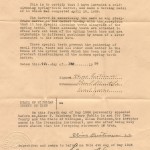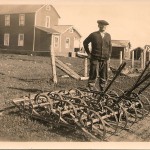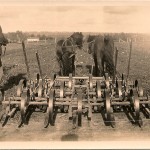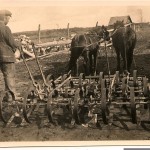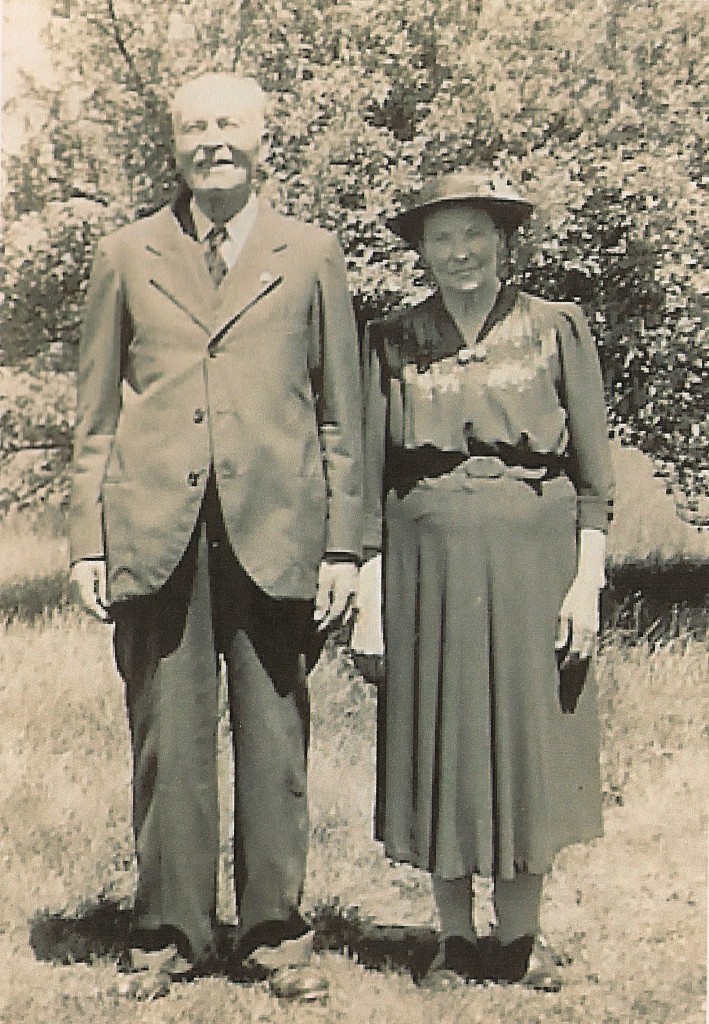
Excerpts from Ines Puotinen’s Memoir
Grandpa Elias and Grandma Johanna both came from Evijarvi, Finland, but they did not get to know each other until they met in this country. Grandma was 17 and grandpa was 24 when they were married. They first lived in Crystal Falls and after a few years they moved to Amasa where they built a home. Later they moved to the farm in Crystal Falls Township. There was a small two room log house to which in a few years a large addition was built. That home with a few minor changes is the present house on the farm….
ELIAS PUOTINEN
Born: March 25, 1869
Died: November 2, 1950
Immigrated to America:
October 28, 1886
Kully’s father (Elias Puotinen) was a very handsome man. He was seventy at the time we got married. He was very methodical in all that he did and always kept himself well groomed. He was referred to as a “gentleman farmer” when the history of Amasa was written in 1966. He did a lot of chores around the farm, such as carrying in the wood, feeding the cattle, and kept the paths shoveled in the winter. He also saw to it that the snow was cleared from the mailbox and underneath the clothes line. In the eleven years that he lived when I was here I never remember hearing him raise his voice in anger.
Elias Puotinen, Gentleman Farmer
He had come from Finland as a young man. He said that he learned the English language from the Sears Roebuck Catalog. He was a very intelligent man and a leader in his church and community. In early years when there was so many who came from Finland and couldn’t speak English, he was interpreter and assisted them in different ways.
Landlooker
My father Elias Puotinen, came from Finland before the turn of the century, finding employment in the Cadiallac-Jennings area pine camps as an axe-man(swamper) and later in the Upper Peninsula as sawyer and eventually as a logging jobber and then a contractor. Thus it became expedient for him to become a skilled landlooker.
A contemporary landlooker of my father who knew Dad only by repute came upon Eli’s footprints on a mutual boundary line. As he contemplated the steady, straight-as-an-arrow trail marked by my Dad’s boots, the other landlooker was heard to remark, “This man I gotta meet!”, and so saying her followed the trail balf-running until he caught up with Eli.
And so it was, as a woodsman, logging contractor, farmer, grocery man, store manager, farm implement dealer, charter member of churches, Temperence Societies, a Kaleva Lodge local, Historical society, and very much in politics without becoming a politician; and whatever he put himself to, that he left his imprints along the way with firmness and integrity. A measure of his rapport with the community at large can be observed from the fact that this anecdote was told to me by a saloonkeeper who was well aware of Eli’s activity in the Finnish Temperance Society. (source)
Image of Elias Puotinen’s Logging Camp, 1913
He and grandma were charter members of the Lutheran Church in Crystal Falls and later when they moved to Amasa they were charter members of the Finnish Lutheran Church there. Grandpa was not a drinking man and had started the Temperance Union in Amasa. He was also vocally talented. When I attended some of my first services in Amasa in church Ellen sat next to me and when we heard this good, strong male voice from across the church, Ellen poked me in the ribs and said, “That’s my pop.” At the time the men always sat on one side of the church and the women on the other. It was in later years that families would sit together.
Grandpa was a very sensitive man and I think any reprimanding of the children had to come from Grandma. In a sense I felt that some of the children rather feared him because of his demand for perfection.
He fathered fifteen children and twelve of them grew to adulthood. He did admit in later years that he had never changed diapers for any of the children. Jenny playfully told him he should do it for the first time with a grandchild.
Grandpa never learned to drive a car and did a lot of walking. He was involved in some jobs where he needed transportation and depended on his sons to provide that. As one knows young men, I can assume it wasn’t always done too willingly, but with seven sons to call upon, there was no problem.
He always treated me with much respect and I could sense that he liked me. There was a very good relationship between he and Kully and I can’t ever remember him bossing Kully. He had several strokes during his last years and he was grateful to Kully for his care and tenderness. We had a birthday party for him when he was eighty years old and he received the many friends and relatives while in bed. He died at the age of eighty-one.
We always felt a little badly about the fact that we didn’t name Art after his grandpa whose name was Elias but was known as Eli. Grandpa was a leader and a credit to the Finnish people and was well respected by all nationalities. He was a farmer, and a logger, with many men working for him. He sold International Harvester machinery. He was an agent for the Finnish Mutual Fire Insurance Company, he worked for the Triple-A-measuring farmers’ fields, and in earlier years was the manager of the Amasa Mercantile Store. He had a large family to rear. I remember being so impressed at his ability to type and also his ability to write such well written business letters in English with as little formal education as he had.
Elias and his Invention
Eli also was a good public speaker. Some of the older Finnish men impressed me for their ability to get up before the public and speak. Grandma told me that as younger men they would get together and practice it. I was very impressed that they would do this to better themselves.
JOHANNA BJORKBACKA
Born: February 29, 1876
Died: February 2, 1962
Immigrated to America:
August 9, 1892
Grandma was also a quiet spoken person. However, I felt in spite of the outward tranquility that she was a person of determination and showed in in a number of ways. In her late seventies she ordered a course in English from the Valitut Palat (Reader’s Digest) and diligently worked on that course. She never spoke English unless she had to but did real well when the occasion demanded it.
She enjoyed weaving rugs and also wove wall hangings from yarn and I believe she wove those for all her children. She knitted and crocheted. She was an avid reader and exchanged newspapers, spiritual books, and novels with friends. She was not an outdoor person and rarely went outdoors unless there was really a need for it. She did the milking with the help of her children as grandpa had never learned to milk. I think that was up to wives and children in Finland.
She often bossed Kully in her quiet insistent way. I remember him telling her that is is fifty years old and should know what he is doing. She answered, “Yes, but you are still my boy!”
We had our own home grown rye and ground rye flour and she made delicious bread. Todd Webb, a friend of Grandpa, would always buy all the bread she had on hand whenever he came over.
Grandpa had always hired help after she gave birth to a child. She told me that one time she stayed in bed many weeks and instead of getting stronger, she was getting weaker so she thought she better get up and about. Ellen was the last of her fifteen children and she was forty-seven was Ellen was born.
Because Grandpa was involved in a number of business ventures etc., agents and friends would stop in unannounced. One Sunday morning Grandpa and Grandma were all set to go to church, and a dark-haired man came over. Grandma told Grandpa (in Finnish), “Now he came over and were just going to church.” He told her in Finnish, ‘Go to church, Eli and I will get along very well.” She had assumed that he wasn’t Finnish because of his dark hair and appearance.
One of our neighbors who was a youngster when the Puotinen family were children told me of how she loved to come there as it was always fun and so much to do. She said she would hurry home and do her chores so she could go there to play. She said that grandma would give them bread and butter or some other goodies. However, I did hear the other side of the story. Grandma said that sometime she would get so tired of all the noise and racket that she would go into the corner bedroom and close the door so she could have a little peace and quiet.
When some of the boys would get rambunctious and would skip school, etc. she would get a switch after them. She told me of Eino climbing on the woodshed roof. She called to him, “If you will come down, I won’t switch you very hard.”
It always impressed me that she didn’t worry much even though she had so many children. She felt she had done the best she could while they were growing up.
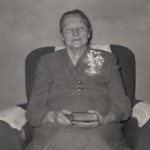 She had several strokes and was bedridden for about two years. She had cancer in her mouth. The doctor came to the house and told us if it was his mother he would take her to the hospital for treatments. After several days there she was transferred to the Crystal Falls Hospital and she died about a week later. She was a few days short of 86 years when she died. Art was going to college in Rock Island at that time.
She had several strokes and was bedridden for about two years. She had cancer in her mouth. The doctor came to the house and told us if it was his mother he would take her to the hospital for treatments. After several days there she was transferred to the Crystal Falls Hospital and she died about a week later. She was a few days short of 86 years when she died. Art was going to college in Rock Island at that time.
Stories about Johanna’s Death
This video gallery couldn't be loaded.
the request to Vimeo failed. the plugin could not retrieve data from the Vimeo API! The requested album couldn't be found.
